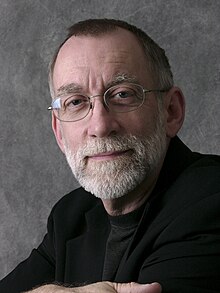Howard Zehr
| Howard J. Zehr | |
|---|---|
 |
|
| Born |
July 2, 1944 Freeport, Illinois, U.S. |
| Academic background | |
| Influences | John Howard Yoder, Nils Christie, Martin Luther King, Jr., Peter Stearns, Vincent Harding |
| Academic work | |
| Main interests | Penology, restorative justice, restorative processes |
| Notable works | Changing Lenses: A New Focus for Crime and Justice (3rd ed, 2005); The Little Book of Restorative Justice (2002) |
| Notable ideas | Restorative justice |
Howard J. Zehr (born July 2, 1944) is an American criminologist. Zehr is considered to be a pioneer of the modern concept of restorative justice.
He is currently the Distinguished Professor of Restorative Justice at Eastern Mennonite University's Center for Justice and Peacebuilding, and co-director of the Zehr Institute for Restorative Justice.
The son of a Mennonite church leader in the midwest, Howard Zehr was born in Freeport, Illinois, and raised through his elementary years in two other Illinois municipalities, Peoria and Fisher. His family moved to Indiana for his middle and high school years. He studied at two Mennonite institutions, for a year each – Goshen College in Indiana and Bethel College in Kansas – before finishing his undergraduate degree in European history at Morehouse College, an all-male liberal arts college that is historically black, in Atlanta, Georgia. Zehr was the first white to earn a B.A. from Morehouse when he graduated in 1966. Thanks to the school’s then-Morehouse College president Dr. Benjamin Mays, Zehr was able to complete his schooling through a minority scholarship that Mays assisted him in securing; Zehr graduated second in his class.
He earned an M.A. in European history at the University of Chicago in 1967 and a Ph.D. in modern European history from Rutgers University in 1974. From 1971 to 1978, he taught at Talladega College in Alabama. He then left academia to do grassroots work, directing a half-way house in 1978 in Elkhart, Indiana, and becoming the founder and director (1978–1982) of an Elkhart County program now called the Center for Community Justice. Through this program, Zehr directed the first victim-offender reconciliation program in the United States. For 17 years, 1979–1996, Zehr directed the Office on Crime and Justice under Mennonite Central Committee (MCC) in Akron, PA. While with MCC, Zehr began doing photojournalism, producing professional-quality photographs that were published in MCC journals and books, such as A Dry Roof and a Cow – Dreams and Portraits of Our Neighbors (Akron, Pa: MCC, 1984). As of 2013, he had five photography-centered books to his name, all published by Good Books of Intercourse, Pa.: Doing Life: Reflections of Men and Women Serving Life Without Parole (1996; Japanese edition, 2006); Transcending – Reflections of Crime Victims (2001; Japanese edition, 2006); The Little Book of Contemplative Photography (2005); What Will Happen to Me?, about the children of prisoners (2010); Pickups: A Love Story (2013), a light-hearted look at pickup trucks and their owners.
...
Wikipedia
